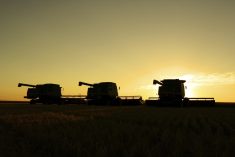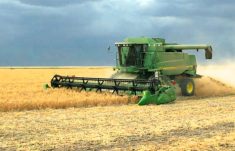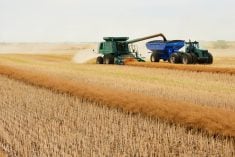The Saskatchewan government is set to lay down new law on who can and can’t buy up farmland in the province, backstopped with more enforcement and heavier penalties.
Agriculture Minister Lyle Stewart on Tuesday introduced amendments to the province’s Farmland Security Act, the legislation that already prevents non-Canadians and entities that aren’t 100 per cent Canadian-owned from having more than 10 acres of Saskatchewan farmland.
The definition of “Canadian-owned entity” in the Act, last updated in 2002, hasn’t specifically included pension plans or investment trusts, which in turn made those entities ineligible — but the amendments will specifically make not only pension plans, but administrators of pension fund assets and trusts, ineligible.
Read Also

U.S. grains: Soy hits four-month high on hopes for China trade deal
U.S. soybean futures jumped to their highest level in more than four months on Monday on hopes that China will resume buying American supplies after President Donald Trump said the countries were set to reach a trade deal during his trip to Asia this week.
The amendments also tighten the definition of “having an interest in farmland” to include any type of interest or benefit (for example, capital appreciation), either directly or indirectly, normally associated with ownership of the land.
The amendments will also require that anyone financing a purchase of farmland must do all such financing through a financial institution registered to do business in Canada, or through a Canadian resident.
The provincial Farm Land Security Board (FLSB), which has the authority to grant exemptions to the land ownership rules, will also get “new and expanded authority” for enforcement of the Act.
For example, at the FLSB’s discretion, any person buying farmland would have to complete a statutory declaration. The amendments will also put the onus on a buyer to prove compliance with the legislation.
The maximum fines for breaching the Act will rise to $50,000 for individuals, up from $10,000, and to $500,000, up from $100,000, for corporations — and the FLSB will get authority to charge “administrative penalties” of up to $10,000.
The new amendments, which follow a round of public consultations held this summer, “will keep farmland accessible to Saskatchewan’s farmers and ranchers,” Stewart said in a release.
The legislation and regulations, once passed, are expected to come into force by the new year, the province said.
Saskatchewan farmland values, until lately, had “lagged behind” those in Manitoba and Alberta, the province said. Values then started rising quickly, on stronger commodity prices, improved net farm income and “historically low” interest rates and relatively favourable loan terms.
The consultations were called in light of “much greater interest in Saskatchewan farmland, including interest from pension funds,” the province said.
The province’s online survey found 87 per cent of respondents didn’t support foreign ownership of Saskatchewan farmland, 69 per cent didn’t support foreign financing and 75 per cent didn’t support allowing pension plans or investment trusts to own such land.
At least one group, the Western Canadian Wheat Growers, recommended the four western provinces take a consistent approach and cap the limit for non-Canadians at 40 acres. British Columbia today has no restrictions, while Alberta and Manitoba have caps of 20 and 40 acres respectively.
The Canada Pension Plan Investment Board (CPPIB), which has so far been allowed to buy farmland under the existing legislation, said in its presentation it supported having a “diverse set of participants” in the farmland market, providing “stability and liquidity” in the land market against any long spell of low commodity prices. — AGCanada.com Network












